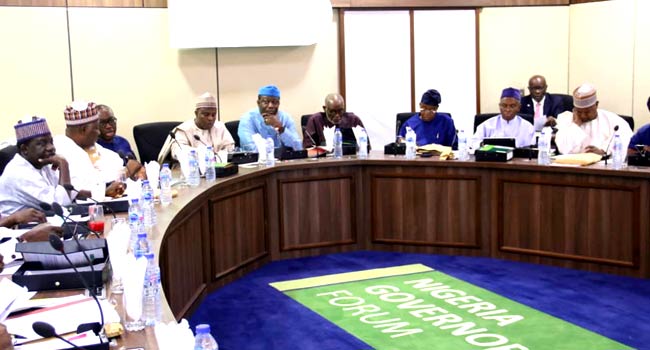NGF report: States may be forced into bankruptcy by new minimum wage.
The proposed minimum wage could put many states out of business, but President Bola Tinubu has pledged to present it to the National Assembly.
In order to facilitate further discussions between the federal and state governments, the business sector, and labour unions, the Federal Executive Council tabled a memorandum on the tripartite committee’s report on the new minimum wage at its meeting last Tuesday.
At last Thursday’s National Economic Council meeting, Tinubu met with the governors under the chairing of Vice President Kashim Shettima. The meeting didn’t address the national minimum wage, which was expected to be discussed.
Additionally, last Thursday, the Southern Governors’ Forum met in Abeokuta, Ogun State, and issued a communiqué outlining their decision to urge all states to negotiate a minimum wage with their employees.
However, in response to the Nigeria Governors’ Forum’s position, which they view as exerting an excessive amount of control over minimum wage discussions, the labour unions have taken a stand.
The NGF report, which was part of the Nigeria Governors’ Forum Secretariat’s “Analysis of State FAAC inflows and state expenditure profile,” expressed concern that states would go bankrupt as a result of increased recurring expenses brought on by the new minimum wage.
The paper states that in 2022, Abia, Ekiti, Gombe, Imo, Katsina, Kogi, Oyo, Plateau, Sokoto, Yobe, and Zamfara will all be in deficit due to recurring expenditures.
Thirteen states would go into deficit and ten would stay financially stable, according to the analysis, if recurring expenditures were to increase by 50%.
According to the fiscal data from 2022, only a handful of states—including Anambra, Bayelsa, Borno, Ebonyi, Gombe, Imo, Jigawa, Kaduna, Lagos, and Rivers—would be able to afford the tripartite committee’s proposed N62,000 minimum wage. This is because it would require a more than 100% increase from the current N30,000.
After deducting ongoing expenses from the state’s overall revenue, the remaining sum is known as net revenue. It indicates a surplus when positive and a deficit when negative.
State coffers are augmented by monthly payments to the Federal Account Allocation Committee, as well as by cash produced domestically, grants and assistance, and constituency development funds.
The records show that Abia pays a monthly payment of N5,837,899,980.40 to its approximately 58,631 employees. Besides paying N894,480,399.62 in pension payments and N579,694,680.33 in debt servicing, the 20,541 people living in Anambra pay a total of N1,824,851,308.96 in salary every month.With 48,213 employees, Bayelsa pays a total of 5,802,435,178.58 N/mo. This includes N1,194,528,784.40 for pensions and N3,535,787,992.48 for debt servicing, for a monthly total of 10,532,751,955.46.
About 13,366 individuals are employed in Benue, and the state pays a total of 66,802,149,932.56 every month for wages (N2,040,184,471.85), pension (N76,838,634.62), and debt service (N64,685,126,826.08).
The monthly total for Delta’s approximately 50,871 employees is N82,890,401,295.89, which includes salary of N8,973,081,853.50, pensions of N1,499,886,303.39, and debt servicing of N72,417,433,139.00.
With 44,831 employees, Jigawa spends N3,141,649,956.14 each month on wages (N2,795,662,113.02) and pensions (N345,987,843.12).
Monthly recurring expenditures amounting to N139,294,944,565.27, N4,457,268,675.54, and N2,653,614,213.35, respectively, in Katsina, Kwara, and Niger, with respective workforces of 19,062, 36,048, and 22,225.In contrast to its total revenue of N147,637,730,867.73, Abia’s total recurring expenditures amount to N111,983,979,958.62, as stated in the paper.
Akwa Ibom has a high income of N444,288,683,000 and a recurring expenditure of N235,144,539,000, whereas Adamawa has a recurrent expenditure of N70,369,399,885.57 and a total revenue of N109,722,949,684.65.
In 2022, Lagos brought in N1,243,778,878,170 and spent N621,043,036,000 on recurring expenses, while Delta came in second with N702,020,717,460.08 and spent N377,905,100,451.83.
In 2022, Rivers earned a total of N525,588,159,714.88 and spent a total of N186,974,715,774.87 on recurring expenses. Kaduna earned N222,349,875,000 and spent N95,987,999,472.10. Ogun earned N297,249,009,626.83 and spent a total of N178,519,010,628.42 on recurring expenditures. Oyo had a total of N247,156,776,739.70 in revenue and spent 152,077,804,384.65.
In 2022, the states of Taraba and Kebbi had the lowest total revenues and recurrent expenditures, respectively, with N101,177,283,069.87 and N75,055,201,412.62 and N57,601,464,374.96 spent, respectively.
According to the statistics collected by the NGF Secretariat in 2022, a number of states had low IGR, which is related to FAAC allocation.
The top four states in terms of revenue were Zamfara State (6,513,960,477.20), Kebbi (8,630,767,122.96), Taraba (9,744,331,840.01), and Yobe State (9,940,554,642.00).
Niger (N14,427,373,136.00), Katsina (N12,821,119,042.64), Plateau (N15,927,001,739.90), Adamawa (N13,175,774,969.53), Benue (N15,021,223,729.38), and Imo (N16,711,346,111.18) all had dismal revenue situations.
Fifteen states have failed to pay their employees the N30,000 minimum wage that was established in 2019.




